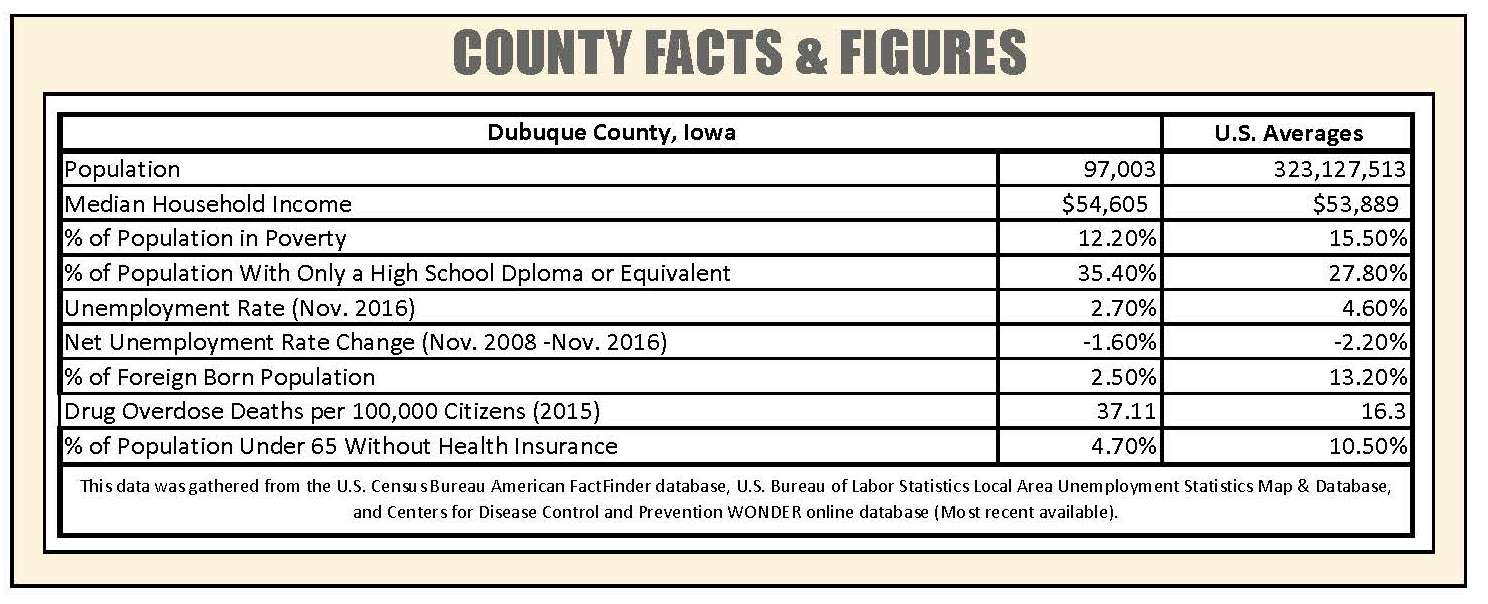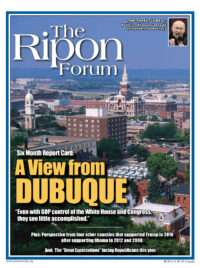“Even with GOP control of the White House and Congress, they see little accomplished.”

Dubuque County does not neatly fit into the standard media picture of Trump Country.
In a county with fewer than 70,000 total registered voters, Democrats hold a roughly 10,000 voter edge over Republicans in terms of registration. Over the past two-plus decades, the County has diversified its economy and experienced significant development of a once-run down industrial core.
With an enviable unemployment rate, and education and income levels at or near national medians, Dubuque County does not display the economic and social factors commonly pointed to as Trump’s recipe for electoral success. But, like many other parts of the country, there was, and remains, a strong sense of frustration and dissatisfaction at the prevailing political and social climate.
While Senator Ted Cruz won the statewide Republican caucus vote in Iowa, President Trump did eke out a close victory over Senator Marco Rubio in Dubuque County during the Caucuses. In the general election, Trump carried both the heavily Democratic-leaning City of Dubuque as well as the rural areas of Dubuque County. Trump swamped Hillary Clinton in the rural areas of the county easily outpacing Mitt Romney’s results in 2012. Clinton underperformed compared to President Obama in the city’s downtown working class precincts (which also are home to the bulk of the county’s minority population).

To get a better sense of what voters in Dubuque are thinking about the early months of the Trump Administration, and to see what might be on the horizon for the 2018 midterm election and beyond, I spoke with a number of voters from across the political spectrum in Dubuque County.
In conversations, the policy areas most pressing to voters here are things such as health care, the economy and jobs, security, fiscal policy, and social welfare programs.
The issues that come up time and again in discussions with voters are not the various palace intrigues regarding the inner workings of the White House, or even the high profile issues such as the various investigations into Russian interference in the election and possible collusion with the Trump campaign. Many Dubuquers follow these issues, to be sure. But in conversations, the policy areas most pressing to voters here are things such as health care, the economy and jobs, security, fiscal policy, and social welfare programs. There is anxiety and frustration that such issues are not being tackled and are instead being obscured.
For many Republicans, the frustration is that now, even with GOP control of the White House and Congress, they see little accomplished. Many note a decided lack of unity among Republicans in Washington. For many Dubuque Democrats, the election loss remains a bitter pill, and this is compounded in their eyes by the policies being pursued by Trump and the GOP Congress, including the dismantling of policies on health care and the environment. For others, the frustration with politics is less rooted in party and more with how the system doesn’t adequately reflect the wishes and needs of the electorate. It is not uncommon to hear criticism from voters across the political spectrum of government as elite, out-of-touch, or part of a system divorced from the needs and experience of the people and too beholden to special interests.

A common theme among many voters is a desire for policy results, and for a government which sees the challenges facing the country and which addresses them constructively and effectively. Some see political divisions expanding and forming an obstacle to effective governance. Such sentiment comes from all sides. As one Republican Trump supporter put it to me, “we have lost the ability to negotiate with each other to address the needs of the people.” Independents often echo this desire most strongly.
There is anxiety and frustration that such issues are not being tackled and are instead being obscured.
While many approve of President Trump ‘shaking things up,’ others here, including some Republicans, worry that not much will change and that the rocky start to the new White House makes Washington’s focusing on issues and policy more difficult. Many Republicans place the blame for the rocky start on the media or on political opponents of the president who seek their own gain by sowing division. Others admit that part of the problem rests with the administration. As one voter remarked, “I support the President’s policies of a common sense travel ban and the wall, but I just wish that they would take his Twitter account away from him.”
The President’s outspokenness is both a strength and liability to many here. For his critics, the concern is often that his demeanor and approach are ill-suited for the presidency. For his staunchest supporters it is only by being outspoken and unrestrained that President Trump can change the political and economic status quo. Others see his actions as simply counter-productive.
Failing to heed the expectation and desire of many Dubuque voters for a more results-oriented politics may be a recipe for electoral defeat here in this pivotal county in Northeast Iowa in 2018 and beyond. Without results, high levels of frustration and anxiety will only continue.
Christopher B. Budzisz is Associate Professor of Politics at Loras College and the Director of the Loras College Poll.




